|
|
|
Sort Order |
|
|
|
Items / Page
|
|
|
|
|
|
|
| Srl | Item |
| 1 |
ID:
112414
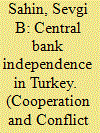

|
|
|
|
|
| Publication |
2012.
|
| Summary/Abstract |
The Turkish state has been going through a neo-liberal transformation resulting from the strategic reorientation of state institutions in ways that enhance and facilitate the strategies pursued by market-oriented social forces. The reform that granted legal independence to the Turkish Central Bank (TCMB) in 2001 was an institutional turning point within the state structure in Turkey; this policy shift prohibited TCMB's granting of credits to the Treasury and other public institutions. Institutionalization of an anti-inflationary approach to macro-economic policy altered the power balance not only between different state agencies, but also between social groups in favour of financial interests that benefited from monetary stabilization. Rooted in a neo-Gramscian framework, this article explores the legal independence of the TCMB as a function of the market-oriented domestic social forces that emerged as a result of the process of neo-liberal globalization initiated in the 1980s. The article also emphasizes how the hegemonic unification of diverse identities and interests around the strategy of achieving price stability was crucial in the autonomy of the TCMB.
|
|
|
|
|
|
|
|
|
|
|
|
|
|
|
|
| 2 |
ID:
112413
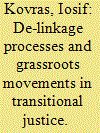

|
|
|
|
|
| Publication |
2012.
|
| Summary/Abstract |
Transitional justice literature has highlighted a negative relationship between enforced disappearances and reconciliation in post-conflict settings. Little attention has been paid to how human rights issues can become stepping-stones to reconciliation. The article explains the transformation of the Cypriot Committee on Missing Persons (CMP) from an inoperative body into a successful humanitarian forum, paving the way for the pro-rapprochement bi-communal grassroots mobilization of the relatives of the missing. By juxtaposing the experience of Cyprus with other societies confronting similar problems, the article shows how the issue of the missing can become a driving force for reconciliation. The findings indicate that a policy delinking humanitarian exhumations from the prospect of a wider political settlement facilitates positive transformation in protracted human rights problems and opens up a window of opportunity to grassroots actors.
|
|
|
|
|
|
|
|
|
|
|
|
|
|
|
|
| 3 |
ID:
112412
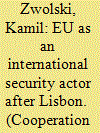

|
|
|
|
|
| Publication |
2012.
|
| Summary/Abstract |
This article argues that a holistic approach is important when studying the European Union's (EU) role as an international security actor, but at the same time it identifies problems in adopting such a comprehensive research agenda. The holistic approach entails that the research must include 'new' security problems, such as climate change, but also relevant policies and instruments outside the framework of the Common Security and Defence Policy (CSDP). However, owing to conceptual, legal and political obstacles, this has been difficult to achieve; as a consequence, existing research on the EU as an international security actor tends to narrow down the focus to just one framework: the CSDP and its operations. This may lead to a distorted image, because the EU's role in international security surpasses any single policy framework. The contribution of this article is twofold. First, it sets the framework for the comprehensive research agenda concerning the EU as an international security actor. Second, it identifies key obstacles that are making this holistic approach methodologically and conceptually difficult. In this context, the Lisbon Treaty, formally abandoning the pillar structure of the EU, provides an opportunity to mitigate at least some of these roadblocks.
|
|
|
|
|
|
|
|
|
|
|
|
|
|
|
|
| 4 |
ID:
112409
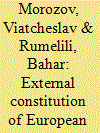

|
|
|
|
|
| Publication |
2012.
|
| Summary/Abstract |
The view of identities as always situated in a relationship with the Other underlies contemporary constructivist social theory. Taking a step further, and combining constructivist approaches to identity with insights from post-colonial studies, this article argues that the Other, far from being a mere presence, often plays an active role in identity politics. By tracing the historically varying ways in which Turkey and Russia have engaged in European identity construction, it demonstrates that this is an interactive process of negotiation between the European Self and its external Others in which agency of the Other is revealed. In particular, Russia and Turkey exercise agency by challenging, each in its own manner, the EU's power to define the normative meaning of Europe. While Turkey has contributed to a decentring of European identity by challenging the self-perception of Europe as a multicultural space, Russia's uncompromising stance tends to consolidate the EU-centred image of Europe as a political community based on liberal democratic values.
|
|
|
|
|
|
|
|
|
|
|
|
|
|
|
|
| 5 |
ID:
112408
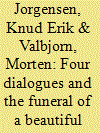

|
|
|
|
|
| Publication |
2012.
|
| Summary/Abstract |
This article engages in the debate on (the study of) regionalism in providing an overview of the nexus between European Studies (ES) and (New) Regionalism (NR). While the immediate purpose for doing so is to set the stage for the future debate on regional dynamics, this exploration can also be perceived as a case study into (the plurality of forms of) inter/intra-disciplinary dialogue demonstrating the necessity of engaging in 'dialogues about dialogues'. The article starts by developing a new typology of four different ideal-typical notions of dialogue: hierarchical, reflexive, transformative and eristic models of dialogue. Each of these models is then used to examine different ways of answering questions about why a dialogue between ES/NR should be of interest or not; what ES has to offer; what the coveted impact of such a dialogue is supposed to be; and, finally, which promises and pitfalls such a conversation holds. In this fashion, the stage for future debate addressing regional integration is outlined. It is concluded that these futures look bleak, however, especially because ES and NR no longer appear as each other's ideal partner-in-dialogue and the relationship is likely to come to an end and hence await its own funeral.
|
|
|
|
|
|
|
|
|
|
|
|
|
|
|
|
| 6 |
ID:
112415
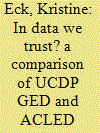

|
|
|
|
|
| Publication |
2012.
|
| Summary/Abstract |
In recent years, several large-scale data-collection projects have produced georeferenced, disaggregated events-level conflict data which can aid researchers in studying the microlevel dynamics of civil war. This article describes the differences between the two leading conflict events datasets, the Uppsala Conflict Data Program Georeferenced Events Dataset (UCDP GED) and the Armed Conflict Location Events Dataset (ACLED), including their relative strengths and weaknesses. The aim of the article is to provide readers with some guidelines as to when these datasets should be used and when they should be avoided; it finds that those interested in subnational analyses of conflict should be wary of ACLED's data because of uneven quality-control issues which can result in biased findings if left unchecked by the researcher. The article concludes that those interested in non-violent events such as troop movements have only ACLED to choose from, since UCDP has not coded such data, but again warns researchers to be wary of the quality of the data. Finally, while the creation of these datasets is a positive development, some caveats are raised in relation to both datasets about the reliance on media sources.
|
|
|
|
|
|
|
|
|
|
|
|
|
|
|
|
| 7 |
ID:
112410
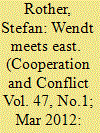

|
|
|
|
|
| Publication |
2012.
|
| Summary/Abstract |
The major theories of International Relations (IRT) differ significantly as far as their concepts of conflict and cooperation are concerned. However, they share one common denominator: They are deeply rooted in Western experiences and intellectual history. Recently, a growing literature on the possibilities and benefits of a non-Western IRT has emerged. This article proposes a 'via media': a theoretical approach that can be applied to Western and non-Western IR alike, taking into consideration the specific historical, ideational and cultural contexts. Based on social constructivism as developed by Alexander Wendt, it is argued that the existence of a collective identity among states in a given region can manifest itself in distinctive logics or cultures of anarchy. These are based on norms of conflict or cooperation that can be established through interaction, can be proposed by outside agents and localized, or can be affected by the re-negotiation of state identity caused by domestic events. In addition, there are cultural path dependencies: norms rooted in the cultural memory or consciousness of a region which tend to be ignored by interpretations that merely focus on current events or established Western models of cooperation. Area studies can contribute to provide this context.
|
|
|
|
|
|
|
|
|
|
|
|
|
|
|
|
|
|
|
|
|